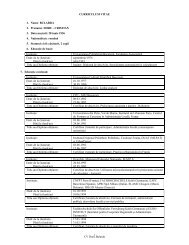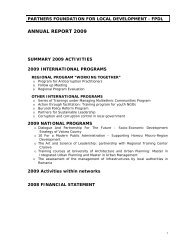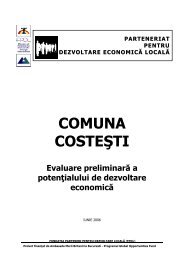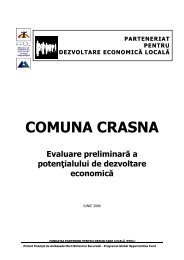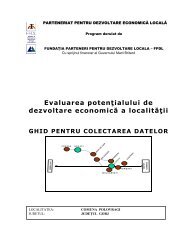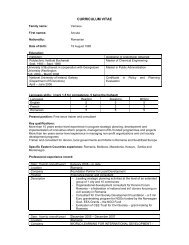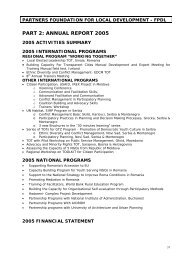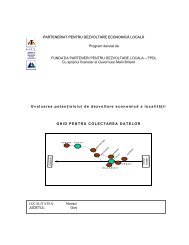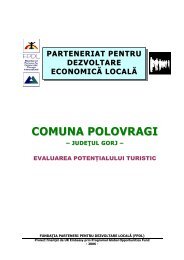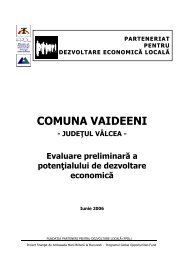Organizational Development: A Manual for Managers and ... - FPDL
Organizational Development: A Manual for Managers and ... - FPDL
Organizational Development: A Manual for Managers and ... - FPDL
You also want an ePaper? Increase the reach of your titles
YUMPU automatically turns print PDFs into web optimized ePapers that Google loves.
Nevertheless, sometimes trainer can just ‘come from the moon’ <strong>and</strong> make a lot of fun <strong>for</strong><br />
participants, playing games with fantastic situations. Sometimes it is the best, when objectives<br />
of the course are to have a fun, to be together, to improve interpersonal relations, etc. In other<br />
cases, such separation from the reality may cause an impression of irrelevance to reality.<br />
Where to be in a course of training course – in given city <strong>and</strong> country, somewhere in Europe, or<br />
even on the moon – it depends from were we are going to come at the end of the process.<br />
12. Outcomes<br />
12.1 PLANNED EFFECTS. Even on the stage of planning training event, objectives are never<br />
coinciding with <strong>for</strong>eseen outcomes. Along with the main products of the training, which, in a<br />
good case, should meet main objectives of the course, some co-products, sub-products <strong>and</strong><br />
other following up effects may be considered as outcomes, whatever desired or not. It should<br />
be clearly defined in an agreement between client <strong>and</strong> training organisation, which effects of<br />
the course will inevitable accompany the desired outcome.<br />
For example, when one group <strong>for</strong>med from officers of Property Department of one big Russian<br />
City have training, it made insulting impact to the relations between leaders <strong>and</strong> ‘internal<br />
opposition’. One leader of sub-department should resign immediately after training; the position<br />
of another one has been drastically changed. Of course, that was not an official agenda of the<br />
training course. However, it could be <strong>for</strong>eseen.<br />
The decision about doing or not that particular training should take in account all<br />
accompanying effects, which are indivisible from the event. Preliminary assumptions about<br />
such effects will depend from the in<strong>for</strong>mation available to decision-makers <strong>and</strong> extent of<br />
uncertainty in any given situation. ]<br />
12.2 ACCIDENTAL EFFECTS. One may also be sure, that actual outcomes will never precisely<br />
coincide with the planned effects. Something may not happen, which was expected to happen.<br />
Something may happen, which was unexpected. Nevertheless, many threats or opportunities<br />
are already given at the beginning of the process, <strong>and</strong> they should not be ignored. Changing<br />
weather, absence of expected or presence of unexpected participant, sickness, curious<br />
combination of circumstances – all that should give no excuse to the trainer. This is an art of a<br />
trainer to be able to catch up any accidental opportunity <strong>and</strong> manage with accidental troubles.<br />
Still, the range of possible ‘accidental’ outcomes worth to be carefully thought out be<strong>for</strong>e the<br />
course. It will give to client an important in<strong>for</strong>mation <strong>for</strong> more conscious decision, <strong>and</strong> will give<br />
a possibility to trainer better prepare himself to the following ‘improvisation’. It is so well known<br />
that only improvisations that are well prepared in advance have a chance to be successful.<br />
217



